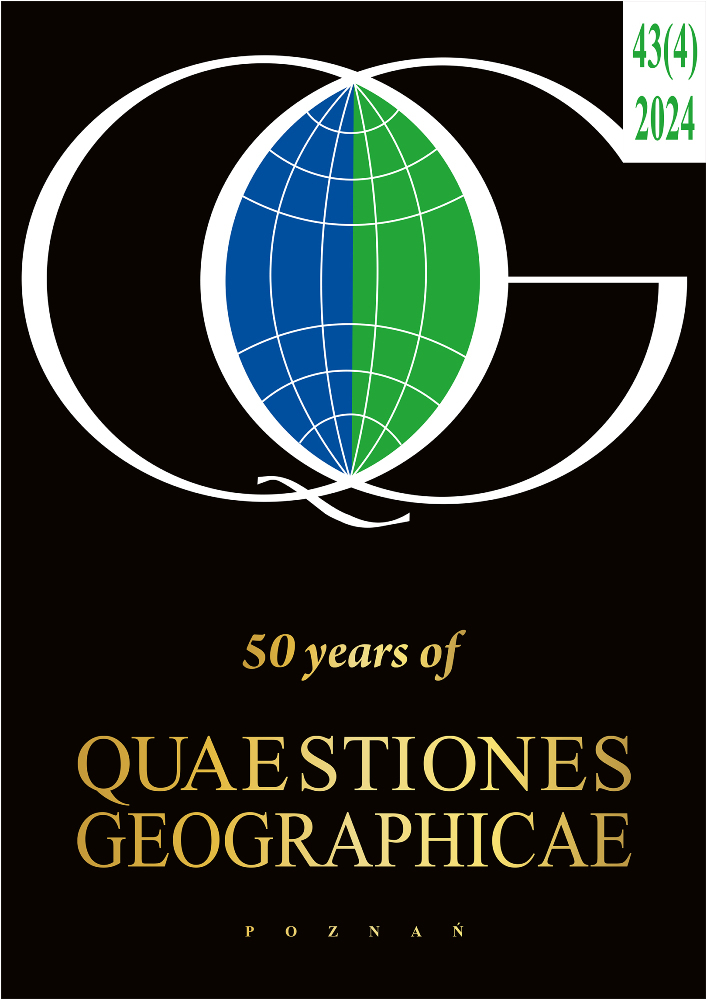Abstract
The journal Quaestiones Geographicae, founded by Professor Stefan Kozarski in 1974, has played a key role in the development of geography and related sciences for five decades, promoting both Polish and international scientific research. Initially focused on physical geography, it evolved towards interdisciplinarity, encompassing a broad range of themes within the geographical sciences. Through its collaboration with the Sciendo platform and adoption of the Open Access model, the journal has expanded its international reach, attracting authors from over 40 countries and achieving an Impact Factor of 1 in 2023. Its most influential publications have explored statistical methods, geodiversity, and geomorphological heritage, highlighting the journal’s interdisciplinary character. The 50th anniversary is an opportunity to reflect on its contribution to the advancement of geography and to set new goals in addressing global challenges such as environmental crises, urbanisation, and digital technology development. Quaestiones Geographicae remains an invaluable platform for knowledge exchange, inspiring future researchers and supporting sustainable development at local and global levels.
References
Anisiewicz R., Palmowski T., 2014. Small border traffic and cross-border tourism between Poland and the Kaliningrad Oblast of the Russian Federation. Quaestiones Geographicae 33(2): 79-86. DOI: https://doi.org/10.2478/quageo-2014-0017
Billah M.M., 2018. Mapping and monitoring erosion-accretion in an alluvial river using satellite imagery-the river bank changes of the Padma river in Bangladesh. Quaestiones Geographicae 37(3): 87-95. DOI: https://doi.org/10.2478/quageo-2018-0027
Bivand R., 1980. A Monte Carlo study of correlation coefficient estimation with spatially autocorrelated observations. Quaestiones Geographicae 6: 5-10.
Bouzekraoui H., Barakat A., El Youssi M., Touhami F., Mouaddine A., Hafid A., Zwoliński Z., 2018. Mapping geosites as gateways to the geotourism management in central High-Atlas (Morocco). Quaestiones Geographicae 37(1): 87-102. DOI: https://doi.org/10.2478/quageo-2018-0007
Domański B., Gwosdz K., 2010. Multiplier effects in local and regional development. Quaestiones Geographicae 29(2): 27-37. DOI: https://doi.org/10.2478/v10117-010-0012-7
Haklay M., Jankowski P., Zwoliński Z., 2018. Selected modern methods and tools for public participation in urban planning – a review. Quaestiones Geographicae 37(3): 127-149. DOI: https://doi.org/10.2478/quageo-2018-0030
Hauke J., Kossowski T., 2011. Comparison of values of Pearson’s and Spearman’s correlation coefficients on the same sets of data. Quaestiones Geographicae 30(2): 87-93. DOI: https://doi.org/10.2478/v10117-011-0021-1
Kaim D., Kozak J., Ostafin K., Dobosz M., Ostapowicz K., Kolecka N., Gimmi U., 2014. Uncertainty in historical land-use reconstructions with topographic maps. Quaestiones Geographicae 33(3): 55-63. DOI: https://doi.org/10.2478/quageo-2014-0029
Kozarski S., Rotnicki K., 1977. Valley floors and changes of river channel patterns in the North Polish Plain during the Late Würm and Holocene. Quaestiones Geographicae 4: 51-93.
Marfai M.A., 2014. Impact of sea level rise to coastal ecology: A case study on the northern part of Java Island, Indonesia. Quaestiones Geographicae 33(1): 107-114. DOI: https://doi.org/10.2478/quageo-2014-0008
Ollier C., 2012. Problems of geotourism and geodiversity. Quaestiones Geographicae 31(3): 57-61. DOI: https://doi.org/10.2478/v10117-012-0025-5
Pelfini M., Bollati I., 2014. Landforms and geomorphosites ongoing changes: Concepts and implications for geoheritage promotion. Quaestiones Geographicae 33(1): 131-143. DOI: https://doi.org/10.2478/quageo-2014-0009
Reynard E., Pica A., Coratza P., 2017. Urban geomorphological heritage. Quaestiones Geographicae 36(3): 7-20. DOI: https://doi.org/10.1515/quageo-2017-0022
Rotnicki K., 1976. The theoretical basis for and a model of the origin of glacio-tectonic deformations. Quaestiones Geographicae 3: 103-139.
Slaymaker O., 2011. Criteria to distinguish between periglacial, proglacial and paraglacial environments. Quaestiones Geographicae 30(1): 85-94. DOI: https://doi.org/10.2478/v10117-011-0008-y
Stryjakiewicz T., Jaroszewska E., 2016. The process of shrinkage as a challenge to urban governance. Quaestiones Geographicae 35(2): 27-37. DOI: https://doi.org/10.1515/quageo-2016-0013
Thomas M., 2012. A geomorphological approach to geodiversity – its applications to geoconservation and geotourism. Quaestiones Geographicae 31(1): 81-89. DOI: https://doi.org/10.2478/v10117-012-0005-9
Zwoliński Z., Stachowiak J., 2012. Geodiversity map of the Tatra National Park for geotourism. Quaestiones Geographicae 31(1): 99-107. DOI: https://doi.org/10.2478/v10117-012-0012-x
License
Copyright (c) 2024 Andrzej Kostrzewski, Joanna Dominiak, Zbigniew Zwoliński, Monika Rzodkiewicz, Krzysztof Stachowiak, Tadeusz Stryjakiewicz

This work is licensed under a Creative Commons Attribution 4.0 International License.

